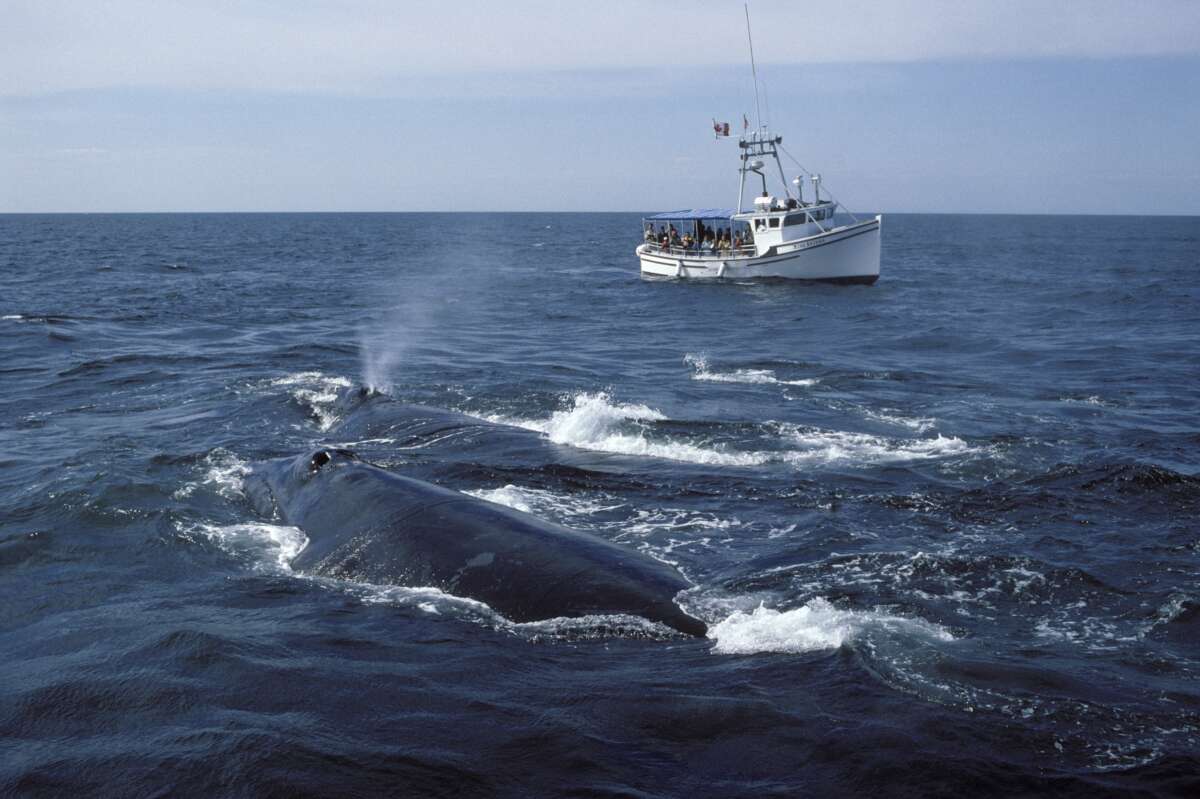The Biden administration on Friday denied an emergency petition aimed at protecting critically endangered North Atlantic right whales from being struck and killed by ships in their calving grounds off the southeastern coast of the United States.
Conservation groups in November asked the National Marine Fisheries Service to establish a rule that mirrors the agency’s yet-to-be-finalized proposal to set speed limits for vessels longer than 34 feet and expand the areas where speed limits apply.
As the petitioners — the Center for Biological Diversity, the Conservation Law Foundation, Defenders of Wildlife, and Whale and Dolphin Conservation — explained, such a regulation “would have helped prevent incidents like the 2021 boat collision that killed a right whale calf off Florida and likely fatally injured its mother.”
The species’ precipitous population decline has continued year after year. Scientists recently estimated that only 340 North Atlantic right whales remain, including just 70 reproductive females that give birth every three to 10 years.
“I’m outraged that the Biden administration won’t shield these incredibly endangered whales from lethal ship strikes,” said Kristen Monsell, oceans legal director at the Center for Biological Diversity. “This is an extinction-level emergency. Every mother right whale and calf is critical to the survival of the species.”
According to the petitioners, the federal agency responsible for stewarding the nation’s marine resources said that it lacks the funds and staff necessary “to effectively implement the emergency regulations.”
Officials from the fisheries service, part of the U.S. Department of Commerce’s National Oceanic and Atmospheric Administration (NOAA), claim that “they are working with vessel operators to get voluntary slow-downs,” the petitioners added, “but voluntary efforts have not proved effective in the past.”
Defenders of Wildlife senior attorney Jane Davenport noted that “right whales have journeyed to the Southeast since time immemorial to birth and nurse their calves in the safety of warm, shallow waters.”
“But the calving grounds have become killing grounds,” said Davenport. “NOAA has dragged its feet on updating the vessel speed rule for over a decade; right whale mothers and calves have paid for this delay with their lives. The agency’s decision not to take emergency action to protect mothers and calves puts the species’ entire future at risk.”
Existing regulations require ships longer than 64 feet to slow to 10 knots or less to safeguard right whales in certain areas at specific times. The fisheries service has acknowledged that bolstering its vessel speed rule is essential to prevent the species’ extinction.
Vessel strikes are one of two leading threats to right whales’ existence. The other key danger is entanglement in commercial fishing equipment.
Friday’s rejection of stronger vessel speed limits comes just weeks after Congress enacted a policy rider that gives the fisheries service until 2028 to issue a new regulation requiring the lobster industry to reduce right whale entanglements. Conservationists condemned federal lawmakers’ move to postpone action in spite of a court decision deeming the service’s current rule unlawful, saying that the yearslong delay is almost certain to doom the species to extinction.
Entanglement in lobster fishing gear kills an estimated four right whales per year — six times higher than the rate considered biologically sustainable. Non-fatal entanglements can also result in illness and interfere with reproduction.
Monsell said Friday that Congress’ betrayal last month makes “protecting right whales from vessel strikes… even more crucial.”
Erica Fuller, senior attorney at the Conservation Law Foundation, expressed disappointment that “the government declined to take immediate action to protect these mothers and newborn calves, and instead chose to continue longstanding bureaucratic practices with a species that can’t afford a single death of another breeding female.”
“The whole world is watching how NOAA plans to save this species,” said Fuller.
As the petitioners explained:
Right whales begin giving birth to calves around mid-November, and the season lasts until mid-April. Their calving grounds are off the southeastern coast from Cape Fear, North Carolina, to below Cape Canaveral, Florida. Pregnant females and mothers with nursing calves are especially at risk of vessel strikes because they spend so much time near the water’s surface. Scientists know of no other calving grounds for the right whale.
“The road to a declining right whale population has been paved by the agency delaying or reducing needed actions,” said Regina Asmutis-Silvia, executive director of Whale and Dolphin Conservation. “Denying our petition to take emergency action only increases the likelihood that even more drastic actions will be needed moving forward.”
Press freedom is under attack
As Trump cracks down on political speech, independent media is increasingly necessary.
Truthout produces reporting you won’t see in the mainstream: journalism from the frontlines of global conflict, interviews with grassroots movement leaders, high-quality legal analysis and more.
Our work is possible thanks to reader support. Help Truthout catalyze change and social justice — make a tax-deductible monthly or one-time donation today.
